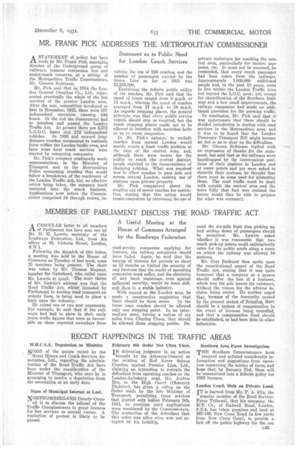MR. FRANK PICK ADDRESSES THE METROPOLITAN COMMISSIONER
Page 65

If you've noticed an error in this article please click here to report it so we can fix it.
Statement as to Public Need for London Coach Services 1-1 A STATEMENT of policy has been made by Mr. Frank Pick, managing director of the Underground group of railways, tramcar companies, bus and motor-coach concerns, at a sitting of the Metropolitan Traffic Commissioner, Mr. Gleason Robinson.
Mr. Pick said that in 1914 the London General Omnibus Co., Ltd„ represented practically the whole of the bus services of the greater London area. .After the war, competition developed so that in November, 1925, there were 197 independent operators running 646 buses. In the end the Government had to interfere and passed the London Traffic Act. At present there are 4,572 L.G.O.C. buses and 212 independent vehicles. In 1926 and onward longdistance coaches commenced to institute fares within the London traffic area, and later some local coach services were started by competing companies. Mr. Pick's company continually made representations to the Ministry of Transport and to the Metropolitan Police concerning troubles that would follow a breakdown of the machinery of • the London Traffic Act, but, no effective action being taken, the company itself ventured into the coach business. Applications now before the Commissioner comprised 34 through routes, in volving the use of 226 coaches, and the number of passengers carried by the Green Line so far in 1931 was 11,256,000. Explaining the definite public utility of the coaches, Mr. _Pick said that the speed of buses ranged from 9 m.p.h. to 12 m.p.h., whereas the speed of coaches averaged from 17 m.p.h. to 19 m.p.h. As regards stopping places, the general principle was that every public service vehicle should stop as required, but the coach stopping places ought not to be allowed to interfere with motorbus halts so as to cause congestion. In Mr. Pick's opinion, to exclude coaches from central London would merely create a fresh traffic problem at the edge of the central zone, and, although there were means for the public to reach the central district, people objected to the inconvenience of changing vehicles. What was required was to allow coaches to pass into and across central London, making use of stations upon private property.
Mr. Pick complained about the singling out of motor coaches for restriction, stating that this action would create congestion by increasing the use of
private motorcars for reaching the central area, particularly for theatre purposes, etc. It must not be assumed, he contended, that every coach passenger bad been taken from the railways. Approximately 1,000,000 additional people bad, in the past 10 years, come to live within the London Traffic Area but beyond the L.C.C. area ; yet, except for electrification of the Southern Railway and a few small improvements, the railway companies had made no additional provision for the growing traffic.
In conclusion, Mr. Pick said that it was unfortunate that there should be divided jurisdiction in dealing with road services in the Metropolitan area, and it was to be hoped that the London Passenger Transport Bill might become an Act so as to clear up the difficulties. Mr. Gleesou Robinson replied with an expression of thanks for the statement, but said that as the railways were handicapped by the inconvenient positions of their stations in London and at outer points and yet were asked to electrify their systems, he thought that there must be some need for protecting them. The road traffic must be dealt with outside the central area and the more fully that fact was realized the better would they be able to prepare for what was necessary.














































































































